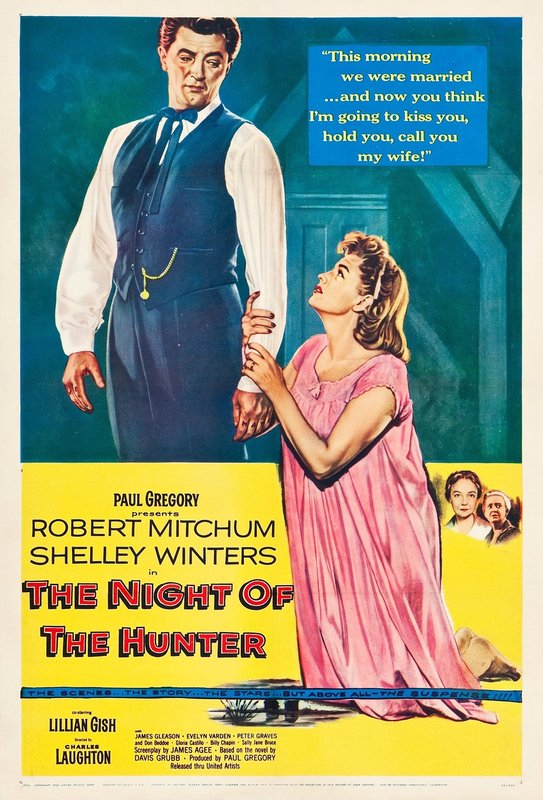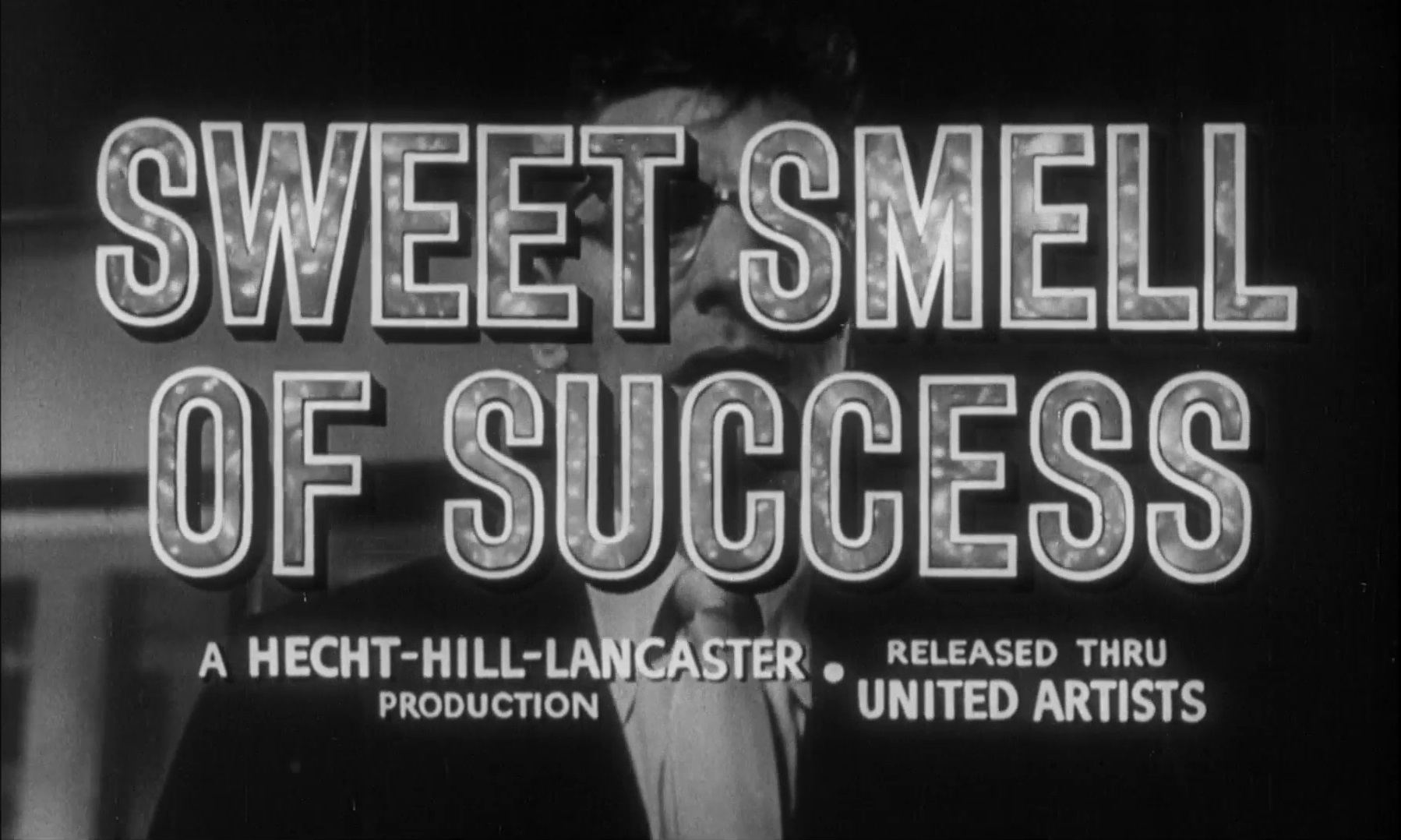
The Night of the Hunter - 1955
Directed by Charles Laughton
Written by James Agee
Based on the novel "The Night of the Hunter" by Davis Grubb
Featuring Robert Mitchum, Shelley Winters, Lillian Gish, James Gleason, Evelyn Varden
Peter Graves, Don Beddoe, Gloria Castillo, Billy Chapin & Sally Jane Bruce
The first time I watched
The Night of the Hunter I was unaware of it's fairy tale quality, and wasn't expecting the sojourn into expressionism and religious analogy - my mind was primed for a straightforward serial killer thrill ride. As far as Robert Mitchum is concerned, I'd grown up with his Max Cady in
Cape Fear and seen him menace Dean Martin with his other preacher-killer Reverend Jonathan Rudd in
5 Card Stud. He outdoes them both here, with Harry Powell one of his crowning achievements performance-wise - but I was thrown by how unusual this movie is. Going into it again, fully forewarned and ready to embrace the enchanting, lyrical quality it has made for a thrilling experience. It has some of the best visual moments in the history of cinema as far as the use of silhouette goes, and one of the cutest little girls I've ever seen in a movie - little Sally Jane Bruce, whose facial expressions are quite simply adorable enough to make me melt.
The film itself features serial killer turned faux-preacher Powell (Mitchum) finding out about a $10,000 cash stash waiting at the home of Ben Harper's (Peter Graves) family, while in prison. A family that consists of mother Willa Harper (Shelley Winters), young John (Billy Chapin) and little Pearl (Sally Jane Bruce). Once out, Powell heads for the small town they live in, ingratiates himself with the locals, and soon persuades Willa (whose husband has since been hanged for murder) to take him on as a supposedly caring husband. Shortly after marrying him, Willa discovers that he's a cruel man - intent on twisting her psyche to match his before dispatching her and working on finding out the money's hiding place from the two kids, who promised their father they'd never tell. The kids flee in a boat, and Powell hunts them down across a great distance before the kids find refuge with Rachel Cooper (Lillian Gish) - a finder and protector of lost children. Will she be able to withstand this killer's psychotic rage and determination?
One time director Charles Laughton, cinematographer Stanley Cortez and art director Hilyard M. Brown do wonderful work with this film, creating angular sets surrounded by darkness, using shadow to great effect in providing Powell with a great sense of menace, and especially making fearful images with the use of silhouette. It all combines in a film noir way that also gives us a sense that this is a fairy tale in full motion - everything stripped back to it's bare elements. Cortez described his work with Laughton on the film as him having a tremendous feeling of "sympatico" with the director - and it's clear everyone was on the same page for what was required. Every shot has it's aim which is squarely achieved to the highest degree of impact, and there are images that chill - such as when the shadow of Powell's head appears next to John in the children's bedroom. That's the first moment the two children become aware of the evil presence that will soon be haunting their lives - the "preacher" just "passing by" a lamp, stalking his prey.
The Night of the Hunter also has some chilling moments I would never have expected a mid-50s film to have - for example that amazing under-water shot of the dead Willa Harper, her hair wispily flowing in the river current. Her eyes closed and puffy face impossibly still - still stuck in the car that's been submerged with her. Or the phallic symbolism which just explodes onto the screen as Harry Powell sits watching the exotic dancer onstage, and we see his switchblade jut upwards, the erect blade tearing through the pocket it's in. To Powell, arousal means something to be stifled - not within himself, but via the eternal stillness the subject of arousal will maintain after he's "quietened" her with his knife. We begin the movie itself by seeing the still legs of his latest victim, discovered by children who will no doubt be forever traumatized by their discovery. Powell's switchblade will become a recurring motif throughout the film - a symbol of his presumed power, small but no less deadly.
One aspect of the story I don't fully connect with though - mostly through ignorance of the subject matter - are the Biblical connotations it has, and although direct references are made and explained to us throughout, I've heard that reading certain chapters of the Bible make it all clearer. It's a two-sided street, for Powell himself uses religion to prey apon unsuspecting people who are forever trustful of a man purporting to be one of faith. The famous quotation “Beware of false prophets which come to you in sheep’s clothing but inwardly they are ravening wolves," comes from Christ himself in Matthew, and Lillian Gish's Rachel Cooper reminds us of not only that, but of the special place children, and their ability to abide, have in the Christian faith. I find it often depends on who's viewing it as to how it's seen - the Roman Catholic Diocese of Cheyenne denied the film's release, even though the message I see in the film is a very positive one. It's all a matter of perspective.
Apart from all that, this is a film experience that has to be seen to be appreciated, as it tells it's story very much visually - and it brings forth some utterly unforgettable and enduring imagery. On it's surface it feels like a familiar fairy tale - with two lost children being chased by the big bad wolf in sheep's clothing across the land until they find refuge with a kindly old lady who protects them and tells them tales of scripture. (I can't forget to add the infuriating Icey Spoon (Evelyn Varden), who the wolf tricks so easily.) Under it's surface it's full of allegory, film noir visual brilliance, and a filmmaking technique from Charles Laughton that I wish we'd seen some more of. At times it feels like your ordinary every-day crime drama, until the night falls and the shadows increase in length - and we're once again hedged in by darkness, Robert Mitchum's daunting visage never far away from pouncing on those unaware of who he really is - a monster based on real-life serial killer Harry Powers, who murdered those victims that had the misfortune of answering his "lonely hearts" advertisements. A real monster hidden in the dark shadows of our collective fear.
 Anyway I'm a huge fan of Wilder. I've seen a lot of his work and been impressed by most of all of it. I should check out more of his work, will maybe after the noir countdown is over.
Anyway I'm a huge fan of Wilder. I've seen a lot of his work and been impressed by most of all of it. I should check out more of his work, will maybe after the noir countdown is over. Anyway I'm a huge fan of Wilder. I've seen a lot of his work and been impressed by most of all of it. I should check out more of his work, will maybe after the noir countdown is over.
Anyway I'm a huge fan of Wilder. I've seen a lot of his work and been impressed by most of all of it. I should check out more of his work, will maybe after the noir countdown is over.


